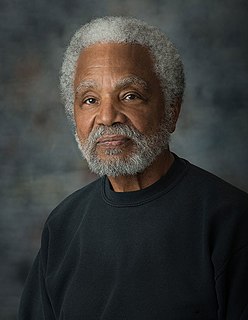Цитата Корнела Уэста
Мартин Лютер Кинг не был ни марксистом, ни коммунистом, но его радикальная любовь заставляет его ставить в центр бедных и трудящихся.
Связанные цитаты
Я думаю, что важно не рассматривать Мартина Лютера Кинга-младшего в узком политическом ключе. Его фундаментальная приверженность заключается в радикальной любви к человечеству, особенно к бедным и трудящимся. И эта радикальная любовь приводит его к радикальному анализу власти, господства и угнетения. Трудно отнести его идеологически к определенной категории.
Мартин Лютер Кинг действительно был предохранительным клапаном для белых людей. Каждый раз, когда казалось, что чернокожее сообщество было на грани того, чтобы действительно сделать то, что мы должны делать, из-за того, что подверглись нападению, они включали Мартина Лютера Кинга по телевидению. Он всегда говорил: «Мы должны использовать ненасилие. Мы должны преодолевать ненависть любовью». Белым это нравилось. Вот почему ему дали Нобелевскую премию. Но когда Мартин Лютер Кинг начал осуждать войну во Вьетнаме, белые люди отвернулись от него.
Американская мечта индивидуалистична. Мечта Мартина Лютера Кинга была коллективной. «Американская мечта» гласит: «Я могу продвигаться вверх и жить хорошей жизнью». Мечта Кинга была в основном христианской. Его приверженность радикальной любви имела непосредственное отношение к его приверженности Иисусу из Назарета, а его мечта имела непосредственное отношение к сообществу, к сознанию «мы», которое включало бедных и работающих людей по всему миру, а не только чернокожих.
Белый человек поддерживает преподобного Мартина Лютера Кинга, субсидирует преподобного Мартина Лютера Кинга, чтобы преподобный Мартин Лютер Кинг мог продолжать учить негров быть беззащитными — вот что вы подразумеваете под ненасильственными — быть беззащитными перед лицом одного из самых жестоких зверей который когда-либо брал людей в плен - вот этот американский белый человек, и они доказали это по всей стране полицейскими собаками и полицейскими дубинками.
Что точно изображено, так это богатая человечность не только Мартина Лютера Кинга, но и движения, которое было многорасовым. У вас были черные и белые, которые собирались вместе и приносили жертвы, организовывая и мобилизуя мир. Это первый раз, когда мы поставили коллективное действие в центр какого-либо изображения Мартина Кинга на экране.
Понятно, что он был невероятно смелым в своей критике превосходства белой расы, имущественного неравенства и имперской власти, особенно в том, что касается войны. Но дезодорировать Мартина Кинга, продезинфицировать или стерилизовать его легко. И я просто хочу показать его радикальную любовь и его радикальный анализ такими, какими они были на самом деле.
Я был радикалом больше всего на свете. Я больше симпатизировал Малкольму Икс, чем Мартину Лютеру Кингу, потому что Малкольм Икс был скорее радикалом, который был готов противостоять дискриминации теми способами, которые, по моему мнению, должны были противодействовать, включая, возможно, применение насилия. Но я действительно просто хотел, чтобы меня оставили в покое. Я думал, что некоторые законы, такие как законы о минимальной заработной плате, помогают бедным и бедным чернокожим и защищают рабочих от эксплуатации. Я думал, что это хорошо, пока профессора не заставили меня взглянуть на доказательства.




























